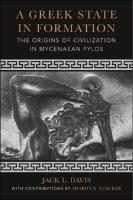A Greek State in Formation
The Origins of Mycenaean Pylos
Abstract
Although the Mycenaean civilization of the Greek Bronze Age was identified 150 years ago, its origins remain obscure. Jack L. Davis, codirector of excavations at the Palace of Nestor at Pylos, takes readers on a tour of the beginnings of Mycenaean civilization through a case study of this important site. In collaboration with codirector Sharon R. Stocker, Davis demonstrates that this ancient place was a major node for the exchange of ideas between the already established Minoan civilization, centered on the island of Crete, and the residents of the Greek mainland. Davis and Stocker show how adoption of Minoan culture created an ideology of power focused on a single individual, celebrating his military prowess, investing him with divine authority, and creating a figure instantly recognizable to readers of Homer and students of Greek history. A Greek State in Formation makes the powerful case that a knowledge of the Greek Bronze Age is indispensable to the classics curriculum. “This is a book to be read, not just consulted. Jack Davis is a masterly raconteur whose story simultaneously provides a wide-ranging and accessible guide to what archaeology is all about, a broad account of the Greek Bronze Age, and a detailed evocation of Bronze Age Pylos.” ROBIN OSBORNE, Professor of Ancient History, University of Cambridge “Accessibly written, this book will appeal to scholars of the ancient world and those with an interest in archaeology as a discipline, as well as anyone following the media exposure of the exciting new finds at Pylos.” KIM SHELTON, Associate Professor of Classics, University of California


 Download
Download Web Shop
Web Shop